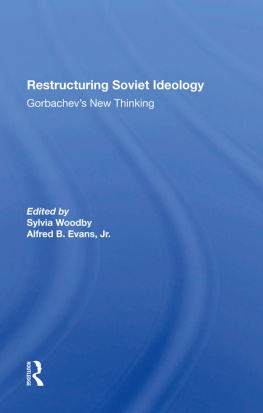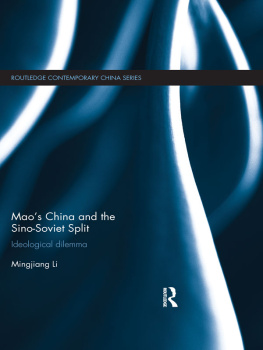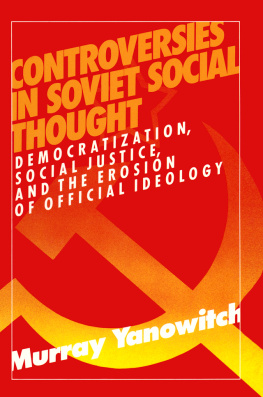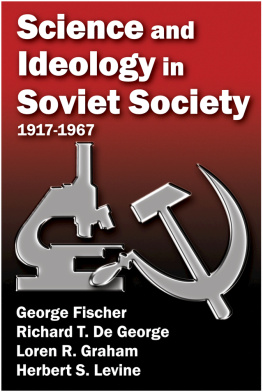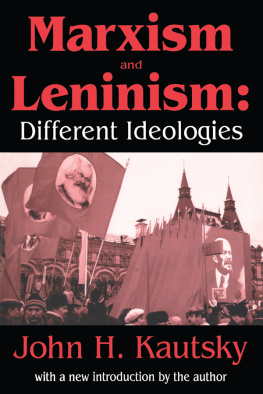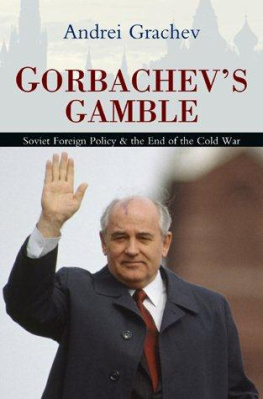First published 1990 by Westview Press
Published 2019 by Routledge
52 Vanderbilt Avenue, New York, NY 10017
2 Park Square, Milton Park, Abingdon, Oxon OX14 4RN
Routledge is an imprint of the Taylor & Francis Group, an informa business
Copyright 1990 by Taylor & Francis
All rights reserved. No part of this book may be reprinted or reproduced or utilised in any form or by any electronic, mechanical, or other means, now known or hereafter invented, including photocopying and recording, or in any information storage or retrieval system, without permission in writing from the publishers.
Notice:
Product or corporate names may be trademarks or registered trademarks, and are used only for identification and explanation without intent to infringe.
Library of Congress Cataloging-in-Publication Data
Restructuring Soviet ideology : Gorbachevs new thinking / edited by
Sylvia Woodby and Alfred B. Evans, Jr.
p. cm.(Westview special studies on the Soviet Union)
Includes index.
ISBN 0-8133-8028-6.
1. Soviet UnionPolitics and government1985- 2. Soviet Union
Foreign relations1985 3. SocialismSoviet Union.I. Woodby,
Sylvia.II. Evans, Alfred B., Jr.III. Series.
DK286.5.R47 1990
320.5322dc20
90-43603
CIP
ISBN 13: 978-0-367-28586-9 (hbk)
1
Introduction
Sylvia Woodby
Ideological change is a central feature of the reform campaign known as perestroika (restructuring) which Mikhail Gorbachev hopes will revitalize the economy and society of the USSR. Not only did these reforms begin with ideology, but as Gorbachev himself has stated, they would have been simply unrealistic and inconceivable without a kind of breakthrough in ideological and theoretical work. By emphasizing that Leninism is a flexible and creative system, Gorbachev has sought to discard dogmatic approaches which make doctrine the servant of conservatism, and tie ideology to the institutional status quo. Gorbachevs emphasis on results and his candor about the many shortcomings of Soviet society provide the driving force behind his demands for new thinking. His iconoclastic approach incorporates a harsh view of accepted wisdom, and has promoted experimentation with hitherto unacceptable ideas in economic, social and foreign policy. In place of rigidity and intellectual conformism, Gorbachev advocates glasnost (openness) and greater tolerance of novel ideas from both domestic and foreign sources. In March 1990, Gorbachev accepted his new post as President of the USSR with a dramatic statement of this outlook:
We have been hampered by inertia, by dogmatic views which have taken root over decades, by a habit of stagnation, by passiveness, by a life of being instructed from above. Whatever the difficulties of an economic and social kind, and acuteness of other problems, the main obstacle on the road of transformations remains the ossification of thinking.
Much of this new thinking attempts to replace antiquated ideological concepts with analysis which more accurately describes contemporary realities. Some of the new thinking is instrumental, and is intended to justify new domestic and foreign policies which will be more successful than some of the old ones. But in many ways perestroika has meant a critical and destructive attack on ideology itselfor on specific doctrines and ideas which Gorbachev has identified as obstacles to change.
Gorbachev defends his commitment to fundamental socialist values, but has been eager to discard or redesign institutions long considered sacrosanct. He has criticized the bureaucratization of Soviet society and insisted that the Leninist legacy be reinterpreted so as to permit the emergence of a more efficient and prosperous modern economy. Gorbachev has also suggested that the Soviet Union shares responsibility for international tensions, and has called for the removal of ideology from interstate relations, because black and white thinking is too dangerous in a nuclear world. In place of class solidarity and alliances with revolutionary forces, Gorbachev proposes international cooperation in the service of universal human values.
The sweep of the reforms Gorbachev has introduced is truly grand. Fundamental rules for managing the economy are being rewritten to permit diverse forms of ownership: Price reform, cooperatives, family farming, wholesale trade, a convertible currency, and many competitive market mechanisms are explicit goals. The budget deficit is now openly discussed, and the new party platform accepts individual ownership of the means of production as appropriate to the present era. Glasnost has meant drastically expanded debate and discussion in the media, in elected bodies and on the streets; openness to foreign citizens and ideas is officially encouraged.
Gorbachev is like all Soviet reformers in that he has targeted those interpretations of ideology which are manifested in ideas, institutions, or practices he wishes to change. But his critique of the past is so thorough as to approach the very Leninist revolutionary imperative. While Gorbachev defends the socialist choice of the Bolshevik revolution, he denounces the authoritarian and bureaucratic system that was established by Stalin and defended by a distorted theory.
By rejecting many of the answers previously provided by the ideology, Gorbachev has sanctioned searching. Today, he has stated, we are facing the complex task of reviving the prestige of Marxist thinking and the Marxist approach to reality. He has challenged Soviet social scientists to fill that vacuum with new ideas about the application of Marxism-Leninism to contemporary circumstances.
Gorbachevs reforms are not only changing Soviet ideology, but may be changing the way in which ideology is used, or the spheres to which it is applied. A great deal of rethinking reflects pressures for ideological adaptation and revision which substantially predate Gorbachevs ascendancy, and which may be understood as the intellectual dimension of the contemporary crisis in Soviet society. A search for new methodologies in social science is one manifestation of this process. Within the large-scale reforms we are witnessing, subtle variations may be observed. Whereas in some areas fundamental components of theory have collapsed or been discarded, in others new ideas about the interpretation of Marxism-Leninisms basic postulates have produced a flurry of novel doctrines.
The complexity and scale of the reform process underway in the USSR admit many interpretations of the meaning and prospects of ideological change. This is not surprising, considering that the character and function of ideology in Soviet society and political life are complex topics which have been widely debated. Moreover, the reform process is not uniform, and is continuing to develop in many directions at once. The essays in this volume are intended to contribute to a careful evaluation of these changes. These essays are neither uniform nor entirely parallel in their subject matter and conclusions. Nonetheless each of them documents a particular aspect or zone of ideological change with important social and political implications. While their judgments differ, each notes significant and serious changes in the content or use of the ideology. The changes they describe raise many questions about the overall impact of perestroika for the future of Marxism-Leninism.

